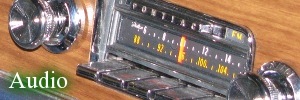















Toyota Remains Japan's Top Corporate Income Earner |
|---|
 Topics: Toyota
Topics: Toyota
|
Steve Herman
Tokyo
May 27, 2005
 Listen to Toyota Remains Japan's Top Corporate Income Earner - MP3 - 351KB - 2:50
Listen to Toyota Remains Japan's Top Corporate Income Earner - MP3 - 351KB - 2:50
An automaker holds on to the top spot for corporate earnings in Japan, while the country's banks continue trying to regain their once dominant position. Those are among the stories in this week's look at the Japanese business news.
For the fifth year in a row, automaker Toyota is Japan's top corporate income earner. Credit research agency Teikoku bases that on Toyota's declared income for the last fiscal year of nearly $8 billion.
Cell phone operator NTT DoCoMo is in second place, but its declared income is barely more than half of Toyota's.
Banks, which occupied many of the top positions on the list until a decade ago, are nowhere to be found among the biggest income earners. Since the collapse of Japan's asset bubble, they have struggled to emerge from under a mountain of bad debts owed by corporate borrowers.
The government now says, however, that Japan's 11 major banks have cut bad loan ratios to such an extent that an end can be declared to the banking crisis.
Financial Services Agency head Tatsuya Ito says the debt burden stifled corporate lending, bank profits and economic growth, creating an obstacle to an economic recovery.
Mr. Ito says the bad loan ratio at the 11 major Japanese banking groups declined to below three percent for the year that ended March 31. That is down from above five percent a year earlier.
But despite the bad debt reduction, some banks continue to face difficulties.
Mitsubishi Tokyo, the country's largest banking group, says its profits plunged in the last fiscal year, while its future merger partner, U.F.J. Bank, is reporting a bigger loss, as it accelerates bad loan writeoffs.
Analysts say Japanese banks are still vulnerable to takeover bids because their profits are slim compared with North American and European rivals.
Japan's customs-cleared trade surplus shrank 10.4 percent in April from a year earlier to $9.5 billion. The Finance Ministry says high oil prices inflated the value of imports.
Despite the narrowing surplus, exports in April were the second highest on record, growing nearly eight percent, the 17th straight monthly increase.
Imports rose nearly 13 percent for the third highest amount on record.
Japan's Prime Minister Junichiro Koizumi and Malaysian Prime Minister Abudllah Ahmad Badawi have finalized a comprehensive trade pact covering most economic sectors.
The agreement, expected to be implemented in December, will not immediately open the Malaysian market to a flood of Japanese vehicles. Tariffs on car parts for Japanese vehicles assembled in Malaysia will be canceled, providing the cars do not compete with domestic models. But Malaysia does not have to fully lift tariffs on imported autos before 2015.
